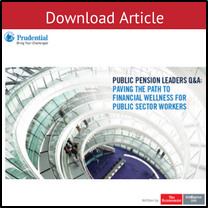U.S. taxpayers are ill-served if public employees are financially ill-prepared for retirement, and many traditional public-sector pensions are at risk today. But poor outcomes are not pre-ordained. Retirement program administrators can offer a broad range of financial education and benefits communications programs to help employees become fiscally fit. The Economist Intelligence Unit discussed preparedness challenges and best practices with two public-sector pension experts: Tracy Guerin, director of the State of Washington Department of Retirement Systems, and Timothy Johnson, executive director of the City of Jacksonville (FL) Police and Fire Pension Fund.
Meeting today’s challenges
Public sector employees who reach retirement without adequate resources will need additional assistance from the state. How do you begin to address that concern as a pension director?
Guerin: That plays in my head a lot. If we don’t prepare our public employees for retirement, they’re going to rely on that safety net, which is already very strained in Washington—as it is in every state. And so we need to do the best job we can preparing them and helping them think about retirement planning. We can’t make them do things like go into our deferred compensation program, but we can do auto-enrollment into savings programs. We can’t make them contribute more to their pension plan, but we can say, here’s an online dashboard that’s going to help you understand where you’re at, and it’s right on the website.
I think all of us in the pension world need to be thinking about that—and understand how truly important our jobs are. The people I’ve met in this space are really committed to having people be retirement ready. Not just because of the burden on the social safety net, but because they want people to be happy and healthy in retirement.
Johnson: I think what’s going to happen is that people are going to work longer. But then, eventually, you’ve got to go. The physical demands of the job mean you can’t be a cop until you’re 70. So, we might see those ages tick up a little bit, but eventually the burden is going to fall on society. And it’s a fact that society isn’t well-prepared for these costs either.
Financial benefit education programs at work
How do you help ensure employees are making smart investment choices, contributing to their retirement plans and aware of their benefits?
Johnson: There’s a strong camaraderie among police and fire workers. So one of the things you need to address through professional benefits education is the bad habit of seeking advice from people you trust who aren’t necessarily financial professionals.
If the employer doesn’t take responsibility for really breaking this habit down and creating something that’s accessible and user friendly, then people are going to revert back to talking to some guy in the department who they think knows what he’s talking about. That’s just very risky.
In the past, there was no orientation for new members. Now my staff of qualified professionals do the orientation for every new hire. These are classes for cops and classes for firefighters who come in as a group about four times a year. We actually go to the police academy and we do the training.
We also have a vesting program, so that when members vest, they are given a refresher about what it means. Their status changes when they become vested, so that’s a great time to give them an enhanced look at their benefits. We also do a DROP [deferred retirement option plan] program. We do this quarterly, and it’s intended for anybody who is a year or two away from retirement. They’re able to bring in their wives, husbands, children, financial professionals. It’s a sophisticated program, so you really need to think about this thing. It’s not something you want to do a week before you’re eligible.
Guerin: Right now we auto-enroll new state employees in the Deferred Compensation Program at 3% of starting salary, which is what our legislation allows us to do. We also make sure that people understand that they can choose to put more in. They can also opt out, and we’re seeing about 10% of workers opting out, which is about as expected. I think the other thing that we can contemplate, once we understand better how auto-enrollment works in Washington, is auto-escalation—automatically raising contributions over time—so the deferral rate rises as they progress through their careers without even having to think about it.
Our education and outreach folks also talk to people more mid- to latecareer and talk about Medicare, health insurance, how much is available for retirement and what they should be thinking about five, six, seven years before they’re ready to retire. This is to help them to make the right decisions and be thoughtful about them. We also do webinars and a couple of summits a year that are aimed at the younger crowd—earlier in their careers—to encourage them start thinking about it as well.
How important is financial benefits education in reducing worker stress in the public sector?
Johnson: I think it’s important. I have nothing empirical to back that up other than the reaction that we get from our members as they go through this. You can tell at every stage. Even at the orientations, we’ve got cops and firefighters who are thinking about retirement. People in public safety think about it more intensely than people in more clerical positions because it’s a dangerous job and they’re looking for what’s going to happen on the outside.
Attracting new talent, and keeping the old
Jacksonville will soon enroll new police and fire employees into a defined contribution plan instead of a defined benefit plan. Do you think there’s going to be a difficulty in retention?
Johnson: The union seems to think so. A young man or woman who is 25 years old and is getting paid a bigger salary—and they’re getting what is effectively a 35% contribution to their 401(a)—is going to vest in eight years and have this chunk of money. The union worries they’re going to take the money to buy a car or house or other more short-term things. Alternatively, if there’s a municipality down the road that’s offering a good salary and a defined benefit, then that’s where they’re going to go next.
The city, I think, believes that they will continue to be competitive on the income side and will continue to entice people to stay because they’re paying a competitive wage. That remains to be seen.
Compared to most states, Washington has a well-funded pension program. Are you concerned that recruitment and retention are going to be affected by the general apprehension about at-risk pensions?
Guerin: In Washington we strive to be an employer of choice for all of our public sector jobs, specifically in state government. That’s something I’ve been really involved in. I think that we can do a better job of talking about what the retirement benefit means in public service than we do now. Our state human resources office is working on putting something together that better describes the health insurance and retirement benefits we have. We really do want people to understand what they’re getting when they come in. It’s still a good benefit.
I think it’s incumbent upon us to be able to talk to anyone in the public and say hey, you want to come to work for state service or public service, and here’s why. Here’s all the great benefits. Not only do you get to serve your fellow Washingtonians, here’s all the great benefits that come with being a public employee.







